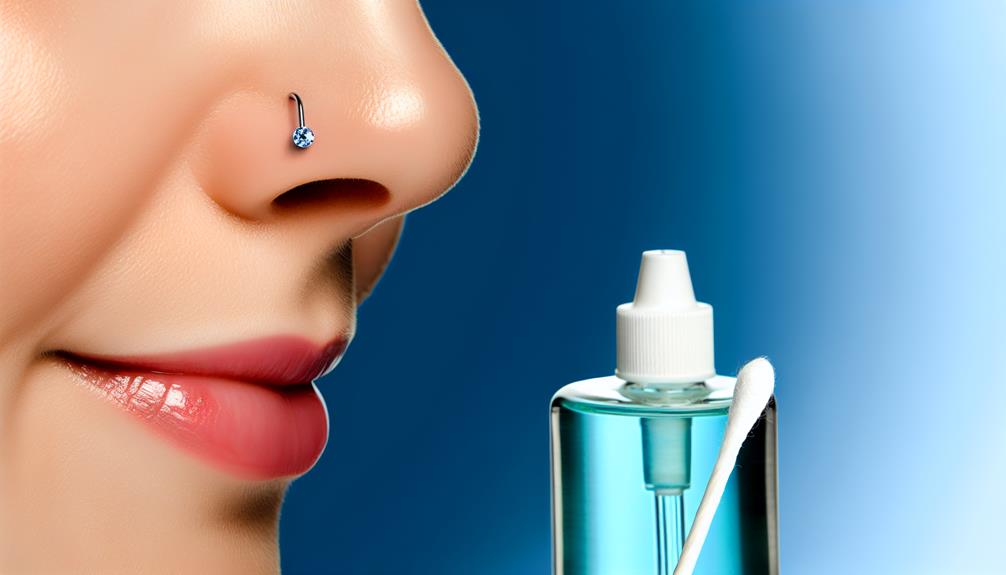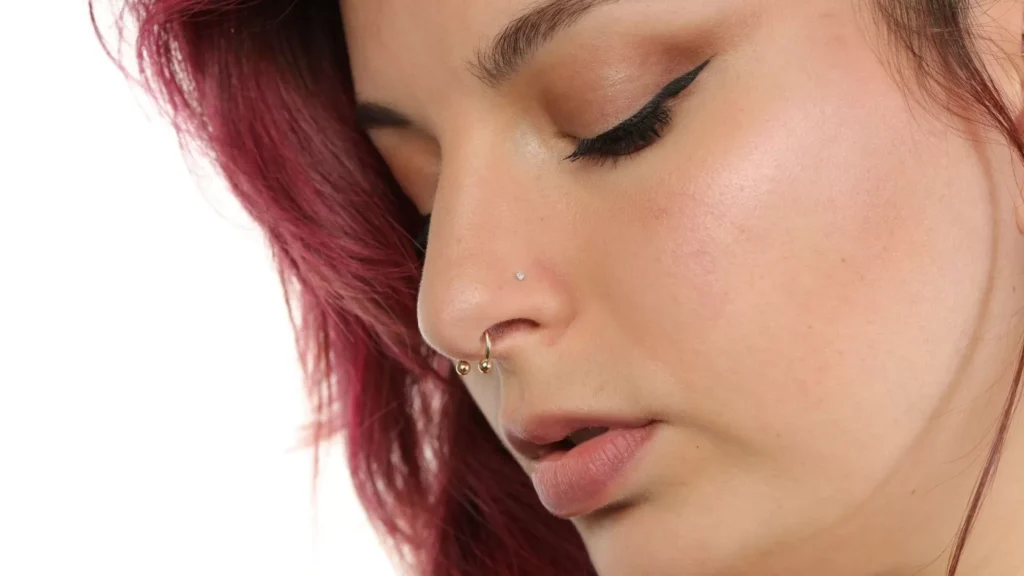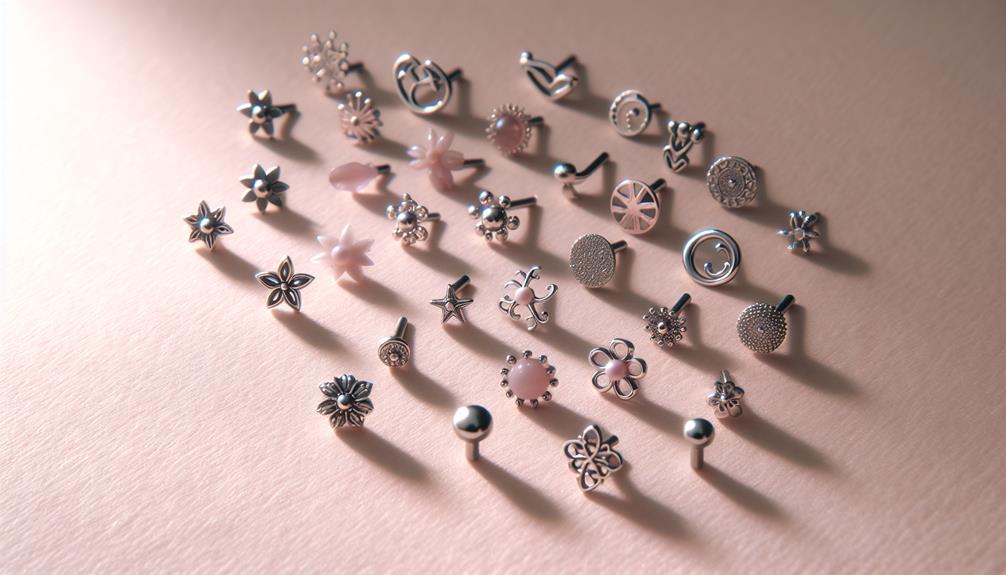In the realm of body art and modification, proper aftercare is essential to ensure the health and proper healing of a new piercing. This brings us to a commonly debated question within the community: Is alcohol an appropriate agent for cleansing a fresh nose piercing? Conventional wisdom and professional piercers often advise against the use of alcohol for this purpose, citing its potential to cause undue irritation and disrupt the delicate healing process. However, some individuals continue to consider its application, drawn to its widespread availability and antiseptic properties. As we explore the intricacies of piercing aftercare, it is imperative to understand the science behind the healing process and the effects various substances may have on it. The following discourse aims to shed light on the risks and potential consequences of using alcohol as a cleaning agent for a nose piercing, while also presenting evidence-based alternatives that can contribute to a safe and optimal healing experience.
Understanding Nose Piercing Aftercare
Proper aftercare is critical for ensuring the healthy healing of a nose piercing and minimizing the risk of infection. When you make the decision to express yourself with a nose piercing, you embrace not only a new aesthetic but also the responsibility that comes with it. Aftercare is not just a set of instructions; it is a commitment to your personal health and to maintaining the integrity of your piercing experience.
The Association of Professional Piercers recommends a saline solution for the aftercare of a new piercing. Saline solutions are gentle yet effective at keeping the area clean and hydrated, which is essential for promoting healing. Unlike harsh chemicals, saline does not irritate the delicate tissue around your nose piercing. To use, simply soak a clean cotton swab with the solution and gently clean around both the entrance and exit points of the piercing.
It is important to avoid alcohol and other astringent substances that can dry out the skin and complicate the healing process. Alcohol can strip away the natural oils that are beneficial for tissue repair, leading to increased irritation and potentially prolonging the healing period. Instead, stick to products designed to promote healing, keeping your spirited quest for personal freedom in mind.
The Role of Alcohol in Cleaning
Alcohol is commonly recognized for its antiseptic properties, which might suggest it as a candidate for cleaning wounds, including piercing sites. However, the application of alcohol to a nose piercing can introduce risks, such as increased irritation and a prolonged healing period. In the context of piercing aftercare, it is critical to assess both the potential benefits and drawbacks of using alcohol as a cleaning agent.
Alcohol’s Antiseptic Properties
Understanding the antiseptic properties of alcohol is crucial, as it plays a significant role in killing bacteria and viruses during the cleaning process. However, while alcohol can be an effective cleaning solution, it’s important to consider the delicate nature of a healing piercing:
- Alcohol’s Efficacy: Alcohol, particularly isopropyl or rubbing alcohol, has strong antimicrobial properties, capable of disrupting harmful pathogens.
- Skin Sensitivity: Excessive use of alcohol can irritate the skin, potentially causing more harm than good.
- Balancing Care: Opt for mild solutions to clean your piercing; avoid using harsh cleansers like alcohol that can cause irritation.
For those who value their personal freedom and autonomy in self-care, embracing the right balance is essential. Alcohol may offer antiseptic benefits, but it should be approached with caution to maintain the integrity of your piercing.
Risks of Alcohol Use
While recognizing the antiseptic benefits of alcohol, it is equally important to address the potential risks associated with its use in cleaning nose piercings. Using alcohol or hydrogen peroxide can cause pain and discomfort due to the drying effect it has on the skin. This can delay healing and, in some cases, cause inflammation. Additionally, using harsh products like alcohol may disrupt the natural bacterial balance and introduce bacteria that can lead to infections. Such risks of alcohol use in cleaning nose piercings underscore the importance of opting for gentler alternatives to clean the area. To minimize the risk of complications and promote a smooth healing process, avoid alcohol-based solutions and seek out milder cleaning options.
Risks of Using Alcohol on Piercings
While alcohol is a common disinfectant, its application on new piercings is not without potential complications. The drying effect of alcohol can irritate the skin and prolong the healing process, making it a less than ideal option for aftercare. It is crucial to consider alternative cleaning methods that support the body’s natural healing mechanisms while minimizing discomfort and the risk of infection.
Alcohol Irritates Skin
Did you know that applying alcohol to a nose piercing can significantly irritate the skin, potentially leading to various complications such as dryness, redness, and prolonged healing times? When you opt for freedom in your personal care routine, it’s crucial to choose methods that promote healing, not hinder it. Using alcohol to clean piercings can backfire, damaging the delicate balance of your skin.
To add depth to this crucial point:
- Alcohol Strips Natural Oils: Harsh antiseptic products like alcohol can remove protective oils, causing the area around the piercing to become excessively dry.
- Delayed Healing Process: The natural healing process can be disrupted, leading to increased healing times and a higher risk of infection.
- Sensitivity and Redness: Alcohol irritates skin, which can result in excessive redness and sensitivity, making it uncomfortable to touch the piercing or even change jewelry.
Delayed Healing Process
Understanding the irritation caused by alcohol on skin, it’s important to further explore how such irritation can exacerbate the delayed healing process for nose piercings. Alcohol’s propensity to dry out skin can strip away natural oils, creating an environment where beneficial bacteria struggle to survive. This imbalance not only slows the body’s natural healing response but also heightens the risk of infection. To promote a swifter recovery, it’s advisable to opt for a gentle saline solution. Prior to any care routine, thoroughly wash your hands to prevent introducing contaminants to the site. Make sure to avoid touching the piercing unnecessarily. To Clean Your Nose Piercing, delicately apply the saline solution with a cotton swab and gently pat the area dry, ensuring the piercing is fully healed before ceasing aftercare practices.
Alternative Cleaning Options
Given the potential risks associated with using alcohol to clean nose piercings, exploring alternative, less abrasive cleaning methods is crucial for the safety and health of the piercing site. Here are three gentle yet effective ways to maintain your piercing:
- Saline Solution: A premade saline solution or a homemade mixture of non-iodized sea salt and warm water can cleanse the area without harsh effects.
- Tea Tree Oil: Dilute tea tree oil with a carrier oil for its natural antimicrobial properties, ensuring you do not overuse it to prevent irritation.
- Professional Piercer Advice: Regularly consult with a professional piercer for personalized care tips, such as how often to clean the area, when to Avoid swimming, and the importance of not touching your piercing unnecessarily as piercings can close quickly.
Embrace these home remedies to protect your freedom of expression through body art while ensuring your piercing heals beautifully.
Safe Alternatives for Piercing Care
To ensure the proper care of your nose piercing, consider employing a saline solution as a gentle yet effective alternative to alcohol for cleaning. Utilizing a homemade mixture of non-iodized sea salt and warm water can be both soothing and conducive to healing, granting you the liberty to manage your piercing care in a safe manner. After cleansing, apply a minimal amount of medicinal grade lavender oil with a clean cotton ball to calm tenderness and aid in recovery, ensuring you avoid alcohol which can be overly harsh and impede the healing process.
For daily upkeep, opt for mild, fragrance-free antibacterial soap to prevent irritation. Always remember to dry with a clean, soft towel or tissue, as this will minimize the risk of introducing new bacteria to the sensitive area. If you encounter persistent discomfort or signs of infection, it is imperative to consult a healthcare provider for professional advice and treatment.
Below is a table that captures the essence of safe piercing care and the freedom it brings to your healing journey:
| Step | Method | Benefit |
|---|---|---|
| Clean | Saline solution | Promotes healing |
| Soothe | Lavender oil | Reduces tenderness |
| Avoid | Alcohol | Prevents irritation |
| Dry | Clean towel | Keeps area sanitary |
| Consult | Healthcare provider | Ensures proper care |
Embrace the autonomy of caring for your piercing with these gentle, effective alternatives. By doing so, you’re not only nurturing your self-expression but also ensuring that your journey to healing remains free from the constraints of harsh chemicals and potential complications.
Signs of Improper Piercing Cleaning
While employing safe alternatives for piercing care can significantly enhance the healing process, recognizing the signs of improper cleaning is crucial for maintaining the health of your nose piercing. An untended piercing can quickly become a hotbed for infection and other complications. Freedom in self-expression through body art like a nose piercing comes with the responsibility of diligent aftercare. Here are the tell-tale signs that your piercing care routine might need a reassessment:
- Persistent Redness and Swelling: While some redness is normal immediately after getting a nose piercing, it should subside gradually. Ongoing redness, swelling, or tenderness that persists beyond the initial healing phase could signal an infection, often due to improper cleaning practices.
- Unusual Discharge and Odor: A clear to slightly yellow discharge is typical during the healing process. However, yellow or green discharge, especially when accompanied by a foul odor, may suggest bacterial or fungal presence, indicating that your current cleaning method is insufficient.
- Excessive Crust or Debris: Some crust formation is expected, but if you notice an accumulation that doesn’t seem to clear up with your cleaning routine, it’s time to reevaluate your approach.
Adopting a routine that includes gentle cleaning with saline solution or a mixture of sea salt and warm water can be effective. It’s important to avoid harsh chemicals and to use cotton swabs for precision in removing debris without irritating the skin. If you notice any signs of improper cleaning, consider switching to a mild antibacterial soap and consult a professional for advice. Remember, proper piercing care is not just about following steps; it’s about responding to the needs of your body to keep your freedom of expression shining brightly.
Professional Advice on Piercing Maintenance
Maintaining a nose piercing properly is essential, and one of the key recommendations from professionals is to clean the piercing twice daily using a saline solution to ensure optimal healing and prevent infection. This routine is a cornerstone of piercing maintenance and is best adhered to with discipline and care.
The saline solution, an isotonic mixture that mimics your body’s natural fluids, is typically made by dissolving non-iodized sea salt in warm water. This blend is gentle yet effective, helping to soothe the area and flush out any debris without causing irritation. A clean tissue should be used to apply the solution to the piercing, allowing the natural healing process to take place unhindered by contaminants.
Professionals in body piercing stress the importance of avoiding alcohol and harsh chemicals, which can disrupt the delicate balance of the healing environment. Similarly, antibacterial soap should be used sparingly and only when recommended by your piercer, as overuse can lead to dryness and irritation.
In the spirit of freedom, it’s crucial to give your nose piercing the space it needs to heal. This means refraining from unnecessary touching and keeping makeup and skincare products away from the piercing site. Interventions should be minimal – clean, dry the area gently, and allow your body to do the rest.
If you notice signs of infection or experience excessive pain or swelling, it’s time to seek professional advice. Piercers are allies in your journey, offering personalized guidance to ensure your piercing maintenance supports both your expression and well-being. Remember that the path to a beautifully healed piercing lies in respecting your body’s healing process and following the aftercare steps designed by those who know best.





